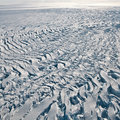News
14 June 2018
Antarctica ramps up sea level rise

Ice losses from Antarctica have increased global sea levels by 7.6 mm since 1992, with two fifths of this rise (3 mm) coming in the last five years alone.The findings are from a major climate assessment known as the Ice Sheet Mass Balance Inter-comparison Exercise (IMBIE), to which TU Delft also contributed, and are published today in Nature.
04 May 2018
Plantenna towards an Internet Of Plants

The 4TU.Federation has awarded a total of 22 million euros to five proposals within the framework of the call ‘High Tech for a Sustainable Future’, thus giving a strong impetus to research into sustainable technology.
20 April 2018
Take geo-engineering seriously as an emergency brake to combat global warming
Geo-engineering. The idea is cropping up increasingly often in answer to the question: what can we change on Earth to curb global warming? First and foremost, we must do everything we can to reduce emissions of greenhouse gases around the world. The Paris climate agreement is an important step in the right direction, but more and more studies are showing that the promises made by the signatory countries will have insufficient effect. So we need to find a quicker way to reduce greenhouse gas emissions but, unfortunately, the global community isn't prepared to do that just yet. At some point, we may need geo-engineering whether we like it or not. The sooner we carry out research into the practical aspects of geo-engineering, the possible pitfalls and the consequences, the better prepared we will be for the future.
12 April 2018
Ruisdael Observatory: measuring the Dutch atmosphere on a 100m scale

‘Weather’ is the result of a combination of many diverse factors, such as solar radiation, the concentration of greenhouse gases, air quality and humidity, local building density or vegetation, wind direction and a whole host of underlying physical and chemical processes.
25 March 2018
Inaudible infrasound also useful for weather and climate forecasts

Research by Pieter Smets of TU Delft and the KNMI shows that infrasound can be used for weather and climate forecasts. These inaudible low sound waves can be used to gain a better picture of the stratosphere, which can barely be measured in any other way. On Wednesday 28 March, Smets will be awarded his PhD at TU Delft for his work on this subject.